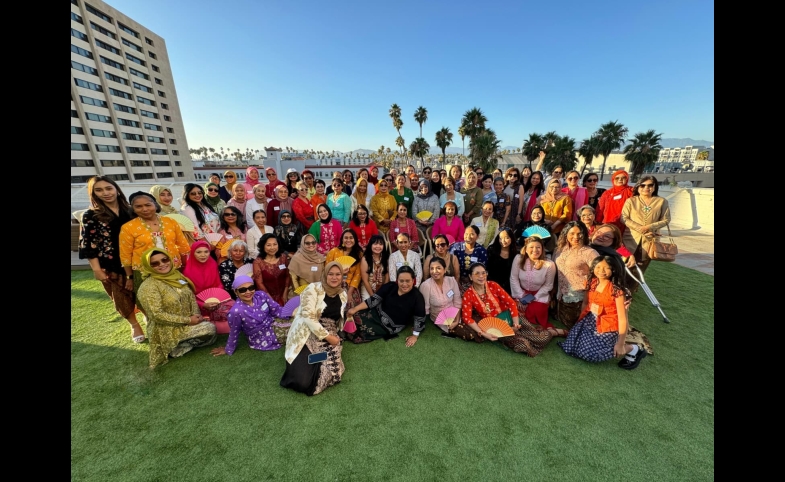The CPD Blog is intended to stimulate dialog among scholars and practitioners from around the world in the public diplomacy sphere. The opinions represented here are the authors' own and do not necessarily reflect CPD's views. For blogger guidelines, click here.

Indonesian Women Diaspora in Diplomacy
“Where are women in the international politics of food, tourism, nationalist movements, military bases, domestic work and diplomacy?” was the question that triggered Cynthia Enloe, one of the world’s most influential feminist scholars, to do the research and eventually came up with her widely quoted book: Bananas, Beaches and Bases, the bible of international feminism.
Over the years, women have started to become more visible and get recognized, but there is still a very long way to go. One tangible progress was the establishment of the International Day of Women in Diplomacy based on United Nations’ Resolution 76/269 in 2022: “recognizing the important contribution that women make to diplomacy and noting the underrepresentation of women in diplomacy”.
Annually commemorated on June 24, this day may seem to be dedicated mainly to female diplomats as the mainstream diplomatic officials. However, there are actually many other groups of women conducting diplomacy in real daily life. In her book, Enloe listed ordinary women with unusual backgrounds playing a significant role in diplomacy, including female textile workers, international bankers, and diplomatic spouse, among others. I would like to add to the list another important group: women diaspora living abroad, promoting and advocating for their countries from afar.
All over the world, diaspora communities in general continue to contribute to the betterment of their homelands, regardless of their citizenship. Moreover, various references specifically indicate that women diaspora play significant roles as the carriers of culture and agents of change. A great example was the Swedish women residing in the United States who are coined as “unofficial ambassadors” by Biltekin, an international relations scholar, for their contribution to cultural diplomacy by engaging in activities enhancing their country. Another example worth mentioning is the Philippines’ diaspora, whose dominance in the caregiving industry is admirable and significant in creating a positive image for their country--an inspiring story that was eventually made into a movie.
In the context of Indonesia, the Foreign Minister’s Annual Press Statement earlier this year in January explicitly acknowledged the contribution of Indonesian diaspora globally and reiterated the government’s commitment to engage them as a valuable, resourceful asset to support Indonesia’s development and global presence. From a diplomatic point of view, the role of diaspora communities as non-state actors has become even more important with globalization and recent technological advancement. They are instrumental stakeholders of the so-called “Indonesia incorporated,” directly involved in strengthening people-to-people contact, enhancing soft power diplomacy. People-to-people contact is categorized as Track Two, or Unofficial Diplomacy, that does not serve to replace but to complement Official Diplomacy (Track One).
Accompanying my husband, who has served as a Consul in the Indonesian Consulate General in Los Angeles, California, for almost two years now, I have witnessed so many constructive efforts initiated by diaspora communities to support both our economic and cultural diplomacy. It should also be noted that Indonesia does have special ties with Southern California, the region where the first batch of the Indonesian diaspora community ever set foot in the 1950s. Los Angeles is currently still home to the largest Indonesian population in USA. Even the establishment of the Indonesian Diaspora Network initiated by Ambassador Dino Patti Djalal in a conference attended by Indonesian descendants from all over the world took place in Los Angeles in July 2012.
"Women of the Indonesian diaspora are an instrumental part of diplomacy, with unwavering dedication, unending creative ideas, and Indonesia’s best interests at heart, always."
Furthermore, I would like to highlight the substantial role of Indonesian women in the Southern California diaspora community. They have contributed significantly to daily diplomacy: from cultural exchange and preservation of Indonesian traditions (cuisine, music, dances, fashion, etc), to network building and cooperation between Indonesia and the United States. Their presence is often taken for granted and may seem to pale in comparison to the more visible official diplomatic activities. Nevertheless, their involvement as "frontliners" in real-life personal relations probably produces more tangible results and does a fair share in creating firmer ties with locals in the long term.
Numerous communities of the Indonesian diaspora are founded based on several features: ethnicity, religion, profession, and interest, to name a few. One organization uniting women members of the diaspora is the Indonesian Women Alliance (IWA), a gathering platform for women of all ages with diverse backgrounds, ethnicities, and professions. Doctors, lawyers, artists, singers, musicians, businesswomen, bankers, chefs, teachers, nurses, social workers, you name it! Together, they have accomplished so much through meaningful activities these last ten years: conducting seminars on women empowerment, cleaning the beach, raising funds for disaster hit areas both in Indonesia and the United States, including the recent California wildfires, not to mention ceaseless initiatives in promoting Indonesia’s rich culture.
Women of the Indonesian diaspora are an instrumental part of diplomacy, with unwavering dedication, unending creative ideas, and Indonesia’s best interests at heart, always. Although many are no longer Indonesian citizens, they are ironically the actual embodiment of “citizen diplomacy” advocating for their motherland from a distance.
Visit CPD's Online Library
Explore CPD's vast online database featuring the latest books, articles, speeches and information on international organizations dedicated to public diplomacy.
POPULAR ARTICLES
-
January 29
-
January 20
-
January 28
-
January 2
-
January 8
Join the Conversation
Interested in contributing to the CPD Blog? We welcome your posts. Read our guidelines and find out how you can submit blogs and photo essays >.









